人教版高中英语必修5知识点归纳总结
- 格式:doc
- 大小:133.50 KB
- 文档页数:30
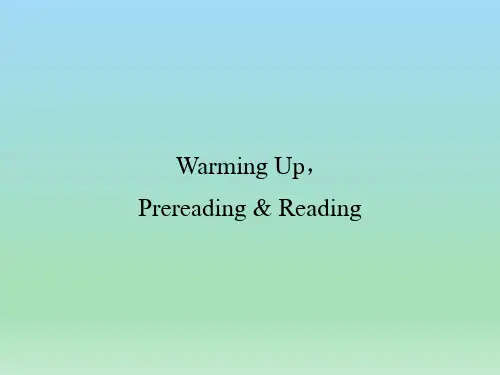
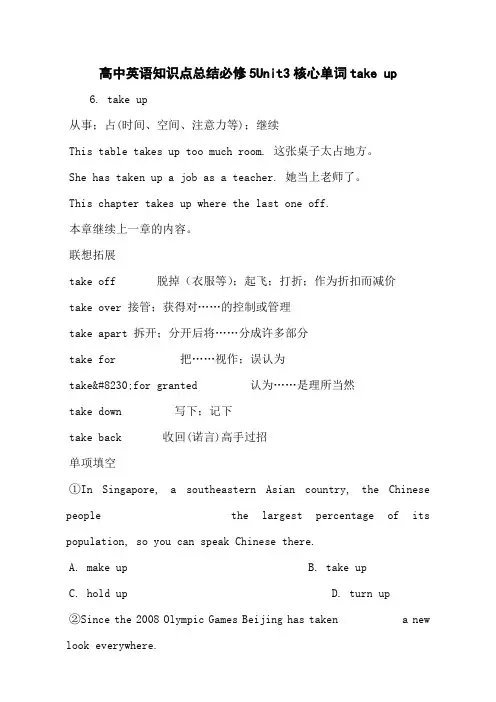
高中英语知识点总结必修5Unit3核心单词take up
6. take up
从事;占(时间、空间、注意力等);继续
This table takes up too much room. 这张桌子太占地方。
She has taken up a job as a teacher. 她当上老师了。
This chapter takes up where the last one off.
本章继续上一章的内容。
联想拓展
take off 脱掉(衣服等);起飞;打折;作为折扣而减价
take over 接管;获得对……的控制或管理
take apart 拆开;分开后将……分成许多部分
take for 把……视作;误认为
take…for granted 认为……是理所当然
take down 写下;记下
take back 收回(诺言)高手过招
单项填空
①In Singapore, a southeastern Asian country, the Chinese people the largest percentage of its population, so you can speak Chinese there.
A. make up
B. take up
C. hold up
D. turn up
②Since the 2008 Olympic Gam es Beijing has taken a new look everywhere.。
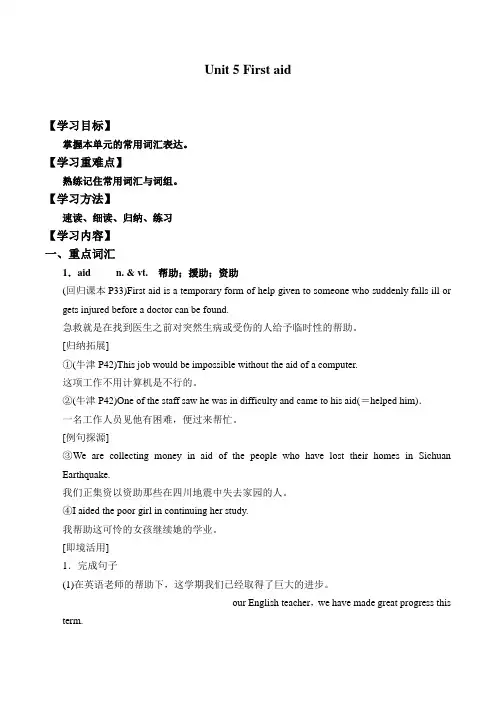
Unit 5 First aid【学习目标】掌握本单元的常用词汇表达。
【学习重难点】熟练记住常用词汇与词组。
【学习方法】速读、细读、归纳、练习【学习内容】一、重点词汇1.aid n. & vt.帮助;援助;资助(回归课本P33)First aid is a temporary form of help given to someone who suddenly falls ill or gets injured before a doctor can be found.急救就是在找到医生之前对突然生病或受伤的人给予临时性的帮助。
[归纳拓展]①(牛津P42)This job would be impossible without the aid of a computer.这项工作不用计算机是不行的。
②(牛津P42)One of the staff saw he was in difficulty and came to his aid(=helped him).一名工作人员见他有困难,便过来帮忙。
[例句探源]③We are collecting money in aid of the people who have lost their homes in SichuanEarthquake.我们正集资以资助那些在四川地震中失去家园的人。
④I aided the poor girl in continuing her study.我帮助这可怜的女孩继续她的学业。
[即境活用]1.完成句子(1)在英语老师的帮助下,这学期我们已经取得了巨大的进步。
________ ________ ________ ________ our English teacher,we have made great progress this term.答案:With the aid of(2)当我身陷困境时,我所有的朋友都来帮助我。
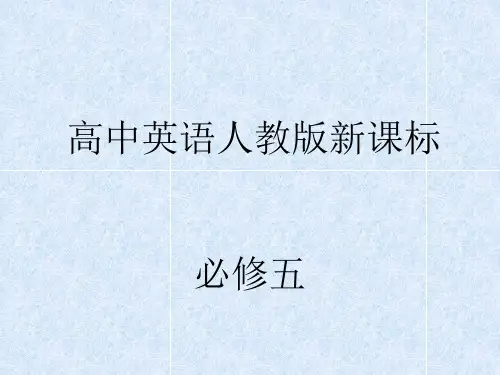
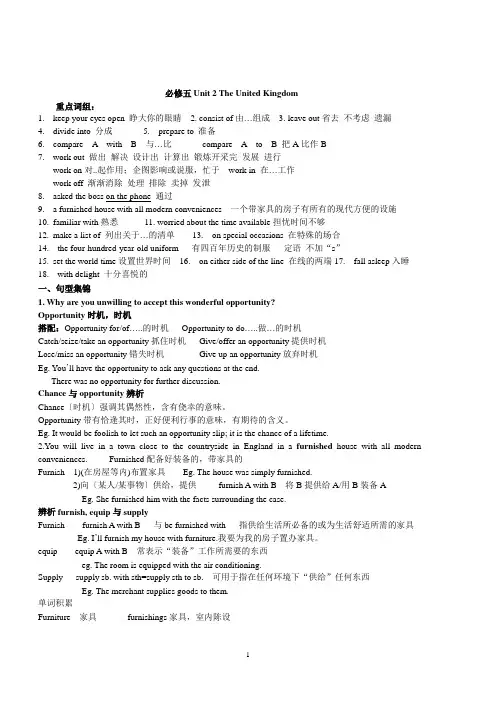
必修五Unit 2 The United Kingdom重点词组:1.keep your eyes open 睁大你的眼睛2. consist of由…组成3. leave out省去不考虑遗漏4.divide into 分成5. prepare to 准备pare A with B 与…比compare A to B 把A比作B7.work out 做出解决设计出计算出锻炼开采完发展进行work on对..起作用;企图影响或说服,忙于work in 在…工作work off 渐渐消除处理排除卖掉发泄8.asked the boss on the phone 通过9. a furnished house with all modern conveniences 一个带家具的房子有所有的现代方便的设施10.familiar with熟悉11. worried about the time available担忧时间不够12.make a list of 列出关于…的清单13. on special occasions 在特殊的场合14.the four-hundred-year-old uniform 有四百年历史的制服定语不加“s”15.set the world time设置世界时间16. on either side of the line 在线的两端17. fall asleep入睡18.with delight 十分喜悦的一、句型集锦1. Why are you unwilling to accept this wonderful opportunity?Opportunity时机,时机搭配:Opportunity for/of…..的时机Opportunity to do…..做…的时机Catch/seize/take an opportunity抓住时机Give/offer an opportunity提供时机Lose/miss an opportunity错失时机Give up an opportunity放弃时机Eg. You’ll have the opportunity to ask any questions at the end.There was no opportunity for further discussion.Chance与opportunity辨析Chance〔时机〕强调其偶然性,含有侥幸的意味。
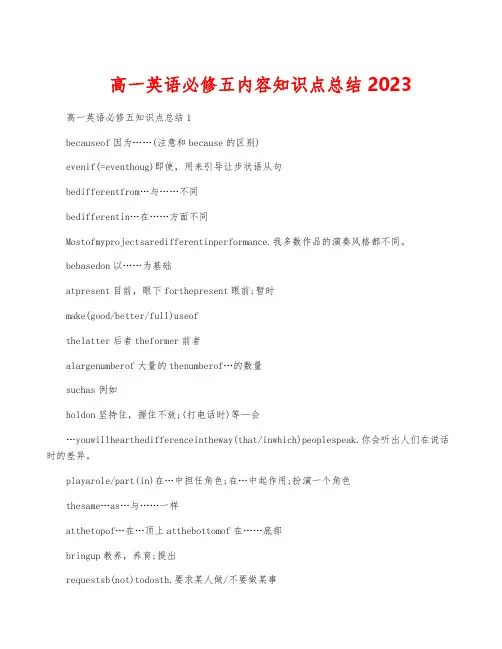
高一英语必修五内容知识点总结2023高一英语必修五知识点总结1becauseof因为……(注意和because的区别)evenif(=eventhoug)即使,用来引导让步状语从句bedifferentfrom…与……不同bedifferentin…在……方面不同Mostofmyprojectsaredifferentinperformance.我多数作品的演奏风格都不同。
bebasedon以……为基础atpresent目前,眼下forthepresent眼前;暂时make(good/better/full)useofthelatter后者theformer前者alargenumberof大量的thenumberof…的数量suchas例如holdon坚持住,握住不放;(打电话时)等—会…youwillhearthedifferenceintheway(that/inwhich)peoplespeak.你会听出人们在说话时的差异。
playarole/part(in)在…中担任角色;在…中起作用;扮演一个角色thesame…as…与……一样atthetopof…在…顶上atthebottomof在……底部bringup教养,养育;提出requestsb(not)todosth.要求某人做/不要做某事besatisfiedwith…对……感到满意,满足于suggestv.(request,insist…)Isuggestedyoudowhathesays.我建议你按照他说的去做。
Isuggestyounotgotomorrow.我想你明天还是不要去了。
Hispalefacesuggestedthathewasinbadhealth.他苍白的脸色暗示了他身体不好。
注意:insist意思为“坚持要求”时后面的that从句用虚拟语气;如果insist意为“强调,坚持认为”的时候,从句可以用任何所需要的时态。
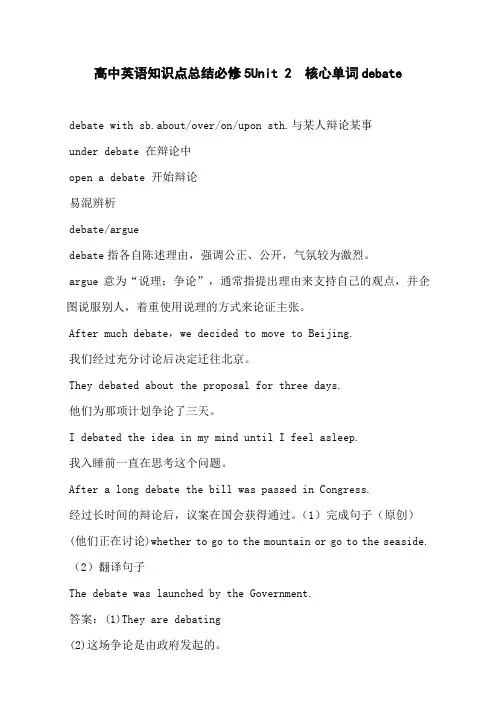
高中英语知识点总结必修5Unit 2 核心单词debate
debate with sb.about/over/on/upon sth.与某人辩论某事
under debate 在辩论中
open a debate 开始辩论
易混辨析
debate/argue
debate指各自陈述理由,强调公正、公开,气氛较为激烈。
argue意为“说理;争论”,通常指提出理由来支持自己的观点,并企图说服别人,着重使用说理的方式来论证主张。
After much debate,we decided to move to Beijing.
我们经过充分讨论后决定迁往北京。
They debated about the proposal for three days.
他们为那项计划争论了三天。
I debated the idea in my mind until I feel asleep.
我入睡前一直在思考这个问题。
After a long debate the bill was passed in Congress.
经过长时间的辩论后,议案在国会获得通过。
(1)完成句子(原创)(他们正在讨论)whether to go to the mountain or go to the seaside.
(2)翻译句子
The debate was launched by the Government.
答案:(1)They are debating。
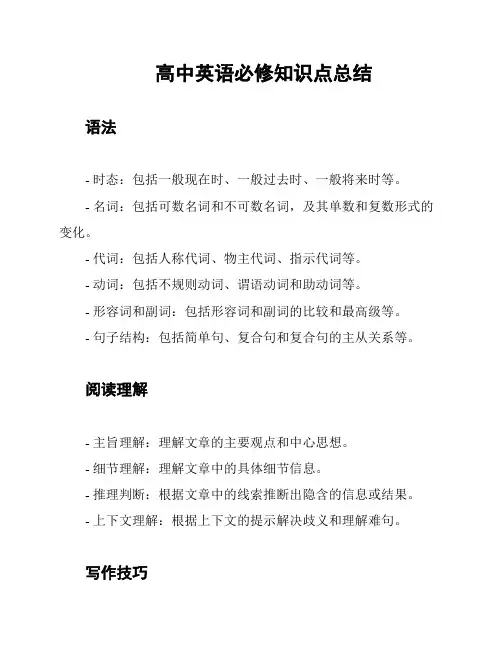
高中英语必修知识点总结语法- 时态:包括一般现在时、一般过去时、一般将来时等。
- 名词:包括可数名词和不可数名词,及其单数和复数形式的变化。
- 代词:包括人称代词、物主代词、指示代词等。
- 动词:包括不规则动词、谓语动词和助动词等。
- 形容词和副词:包括形容词和副词的比较和最高级等。
- 句子结构:包括简单句、复合句和复合句的主从关系等。
阅读理解- 主旨理解:理解文章的主要观点和中心思想。
- 细节理解:理解文章中的具体细节信息。
- 推理判断:根据文章中的线索推断出隐含的信息或结果。
- 上下文理解:根据上下文的提示解决歧义和理解难句。
写作技巧- 作文结构:包括开头、中间段落和结尾。
- 句子连接:使用适当的连接词和过渡性短语使文章连贯。
- 词汇运用:使用丰富的词汇和恰当的词汇搭配。
- 写作风格:根据不同的写作目的和读者需求选择合适的写作风格。
- 表达观点:清晰地陈述观点并给出支持观点的理由和例证。
听力技巧- 预测内容:根据题目和问题预测听力材料中的内容。
- 注意细节:关注听力材料中的关键细节信息。
- 笔记技巧:采用简化和缩写的方式记录重要信息。
- 推断意义:根据听力材料推断出具体含义和结果。
口语表达- 提供观点:清楚地陈述自己的观点和观点的理由。
- 回答问题:明确回答提问者的问题,避免模棱两可。
- 灵活运用词汇:使用恰到好处的词汇进行口语表达。
- 流利连贯:组织语言流畅,避免过多停顿和重复。
以上总结了高中英语必修的一些知识点和技巧,希望对你有所帮助。
_(注意:以上总结内容根据一般情况,具体教材要结合实际情况进行掌握。
)_。
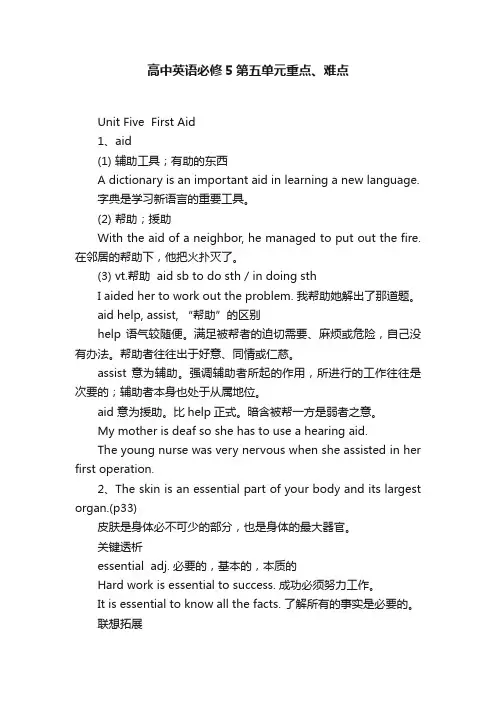
高中英语必修5第五单元重点、难点Unit Five First Aid1、aid(1) 辅助工具;有助的东西A dictionary is an important aid in learning a new language.字典是学习新语言的重要工具。
(2) 帮助;援助With the aid of a neighbor, he managed to put out the fire.在邻居的帮助下,他把火扑灭了。
(3) vt.帮助 aid sb to do sth / in doing sthI aided her to work out the problem. 我帮助她解出了那道题。
aid help, assist, “帮助”的区别help 语气较随便。
满足被帮者的迫切需要、麻烦或危险,自己没有办法。
帮助者往往出于好意、同情或仁慈。
assist 意为辅助。
强调辅助者所起的作用,所进行的工作往往是次要的;辅助者本身也处于从属地位。
aid 意为援助。
比help正式。
暗含被帮一方是弱者之意。
My mother is deaf so she has to use a hearing aid.The young nurse was very nervous when she assisted in her first operation.2、The skin is an essential part of your body and its largest organ.(p33)皮肤是身体必不可少的部分,也是身体的最大器官。
关键透析essential adj. 必要的,基本的,本质的Hard work is essential to success. 成功必须努力工作。
It is essential to know all the facts. 了解所有的事实是必要的。
联想拓展be essential for/to…对……来说是必要的Water is essential to the growth of crops. 水对庄稼生长是必要的。
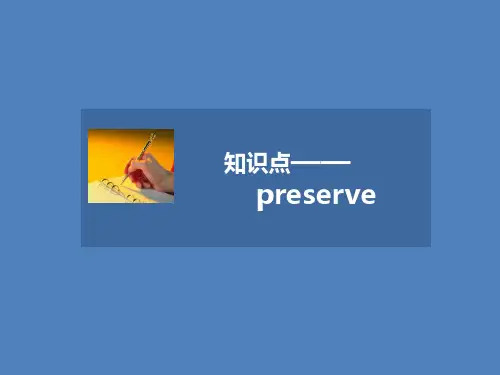
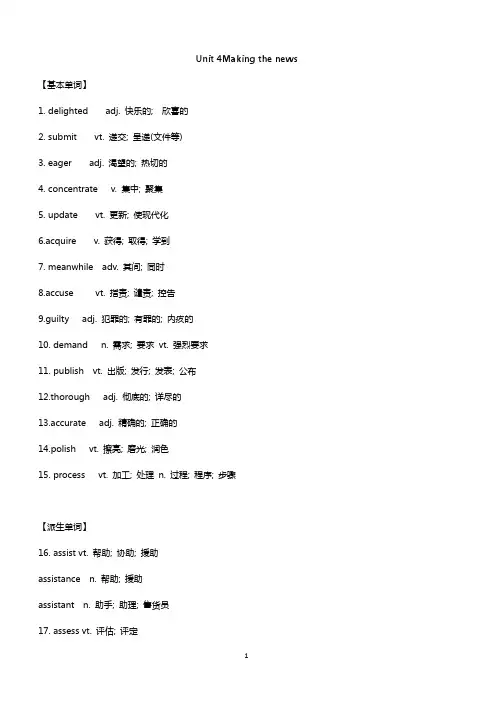
Unit 4Making the news 【基本单词】1. delighted adj. 快乐的; 欣喜的2. submit vt. 递交; 呈递(文件等)3. eager adj. 渴望的; 热切的4. concentrate v. 集中; 聚集5. update vt. 更新; 使现代化6.acquire v. 获得; 取得; 学到7. meanwhile adv. 其间; 同时8.accuse vt. 指责; 谴责; 控告9.guilty adj. 犯罪的; 有罪的; 内疚的10. demand n. 需求; 要求vt. 强烈要求11. publish vt. 出版; 发行; 发表; 公布12.thorough adj. 彻底的; 详尽的13.accurate adj. 精确的; 正确的14.polish vt. 擦亮; 磨光; 润色15. process vt. 加工; 处理n. 过程; 程序; 步骤【派生单词】16. assist vt. 帮助; 协助; 援助assistance n. 帮助; 援助assistant n. 助手; 助理; 售货员17. assess vt. 评估; 评定Assessment n. 评定; 评价18. inform vt. 告知; 通知information n. 信息; 消息19.senior adj. 年长的; 高年级的; 高级的(反义词)junior adj. 青年的; 低下的20. approve vt. 赞成; 认可; 批准approval n. 批准; 认可【短语】1. 集中; 全神贯注于concentrate on2. 依靠; 依赖depend on3. 因……指责或控告……accuse …of4. 为了(做)……so as to (do sth.)5. 在……前面ahead of6. 对……有敏感的嗅觉have a good nose for7. 通知某人某事inform sb. of sth.8. 记在心里keep in mind9. 完全误解; 弄错get the wrong end of the stick10. 最后last of all【句式】1. Never will Zhou Yang (ZY) forget his first assignment at the office of a popular English newspaper. 周阳永远不会忘记他在一家畅销英文报纸的第一项工作任务。
Unit 2 The United KingdomPart 1. Warming up1.Do this quiz and find out how much you know about the UK.know about=know of 了解be known as…作为…而出名be known for…因。
而出名Kate is well-known as a poet, but nor for speeches.as far as one knows 据某人所知make oneself known to sb.自我介绍2. How many countries does the UK consist of?consist vi.组成;在于;一致consistent adj.一致的;调和的consistence=consistency 一致性consist of=be made of 由……组成注意consist of没有被动语态和进行时态。
consist in...存在于……;在于……consist with...与……一致be consistent with...与……一致运用完成句子(1)这个俱乐部由大约50 名会员组成。
This club ____________ about 50 members.(2)理论应与实践相一致。
Theory should ______________________________ practice.(3)这个计划妙就妙在简明扼要。
The beauty of the plan _______________ its simplicity(4)你的行为和你所说的不一致。
Your conduct is not _______________ what you say.consists of consist with/be consistent withconsists in consistent with3. Who rules the UK..rule (1)v.统治,管辖;控制,支配;判定,裁定rule(over) sb./sth. 统治者rule on sth. 对。
必修5 Module 3 Adventure in Literature and the Cinema知识点整理二13.tie(1)v(用绳、带等)绑、系、拴tie up把……捆绑起来tie…to…把……绑到……上tie sth with sth 用某物捆绑某物The thief was brought in with his hands tied behind his back.I used tape to tie up the box.我用带子绑这个盒子。
He had tied the dog to one of the trees near the canal.(2)n领带;绳子Jason had taken off his jacket and loosened his tie.(1)I noticed my little dog_____(tie up) and I was angry.(2)She grabbed her hair in both hands and swept it back,____a loose knot.A.tryingB.tiringC.tyingD.tight(3)Have you seen the horse____the pole over there?A.tied toB.tying atC.tied byD.tied with(1)tied up (2)C她用双手揽起头发,拢到脑后,挽成一个松松的结。
(3)A14.have had enough of对……已经厌烦透了;受够……了I‟ve had enough of your complaint.(1)I‘ve decided to move to the countryside,for I‘ve had____of the noises here.A.enoughB.sufferedC.noneD.little(2)The lady has had____of her rude husband and has made up her mind to leave him.A.enoughB.noneC.nothingD.some(1)A (2)A15.panic vt & n(1)vt(使)恐慌;(使)惊慌失措搭配:panic sb into doing sth吓得某人做某事Many people were panicked into leaving the country.许多人吓得离开了那个国家。
必修 5 Unit 1 Great scientists 核心单词 1. characteristic n.特色;特性;典型 adj.特有的,表示特性的;典型的 Kindness is one of his characteristics.和善是他的特性之一。 A characteristic of the camel is its ability to live for a long time without water.骆驼的一个特点是不喝水也能活很长时间。 易混辨析 character/characteristic character n.性格,品质(本身具有的);角色,人物;字体,字符 characteristic n. 特点,特征(用以区别于其他事物的) 2. defeat vt.击败;打败;使(计划、希望)落空 Our team defeated our opponent by 5:0.我们队以五比零的比分战胜了对手。 He was defeated in his plan.他的计划失败了。 易混辨析 defeat/conquer/overcome 三个词都含有“战胜”、“击败”的意思。 defeat指“赢得胜利”,尤其指军事上的胜利,如:defeat the enemy(打败敌人)。 conquer指“征服;战胜”,尤其指获得对人、物或感情的控制,如:conquer nature(征服自然)。 overcome指“战胜;压倒;克服”,尤其指“感情”,如:overcome difficulties(克服困难)。 defeat/beat/win defeat, beat都表示在战斗或竞赛中“战胜,打败(对手)”,后接竞争对手。如:beat the competitor/the country/the team ...打败对手/国家/团队…… win也表示“战胜,赢得”,但它的宾语通常是比赛、战争、奖品或表示尊重、崇拜之类意义的词。如:win a race/a battle/a war/a scholarship/a prize/a medal/success/friendship/reward ...赢得比赛/战役/战争/奖学金/奖品/奖章/成功/友谊/奖赏…… 3. attend v. 注意;留意;处理(与to连用)=do with; 出席;到场;照看;照料=take care=look after 常用结构: attend school/college 上学/上大学 attend a lecture/meeting 听讲座/出席会议 attend a wedding/ceremony 出席婚礼/参加典礼 attendance n. 出席;出席的人数;伺候;照料 We’ll attend to the problem later. 稍后我们将关注这个问题。 Which doctor is attending you? 哪个医生为你看病? 4. expose vt.暴露;揭露;使曝光,常与介词to连用,表示“使暴露于(日光、风雨等);受到风险;使面临”。 常用结构: expose sth./sb./oneself (to ...) 显露或暴露于…… be exposed to 暴露于…… Don’t expose it to the rain/wind.别让它被雨淋/风吹。 The soldiers in the open field are exposed to the enemy’s fire. 空地里的士兵暴露于敌人的火力之下。 The crime of the corrupt officials must be exposed without any reserve. 对贪官污吏的罪行一定要毫无保留地 予以揭发。 5. cure vt.&n. 治愈,治疗;常用于“cure sb. of ...”结构中。 The doctor cured her of a bad cold.医生治好了她的重感冒。 It is possible to cure the sickness.治愈这种疾病是可能的。 易混辨析 cure/treat/heal/recover cure意为“治疗;治愈”,多用于指药物治疗并治愈某种疾病或改正不良习气。 treat为日常用语,意为“治疗;医治”,指治疗病人的全过程或活动。 heal意为“治愈(伤口);医治”,指治好外伤或烧伤后的部位,使伤口愈合,不用于指治疗感冒等疾病。 recover意为“痊愈,复原”,主要是指从病中痊愈了,常与from连用。 That pill cured my headache.那种药片治好了我的头疼。 That will cure him of his bad habits.那将改正他的坏习惯。 There are only two doctors to treat more than 50 patients.只有两名医生来治疗50多个病人。 The wound on my arm has healed.我胳膊上的伤已痊愈了。 He’s now fully recovered from his bad cold.他现在已完全从重感冒中康复了。 6. absorb vt. 吸收;吸引;吸收(液体,气体,光,声等);汲取,理解(知识等);使全神贯注;吸引(注意等),后常接介词in/by;合并(公司等);吞并;常接介词into;承受;经受。 联想拓展 absorbed adj. 精神集中的 absorbing adj. 十分吸引人的 absorb from sth. 从……中吸收 be absorbed in 专心于,全神贯注于 Cotton gloves absorb sweat.棉手套吸汗。 So many good ideas! It’s too much for me to absorb all at once. 这么多好主意!我很难一下子完全吸收。 The old man was completely absorbed in the book.老人全神贯注地读这本书。 The surrounding small towns have been absorbed into the city. 四周的小城镇已并入到这座城市中。 7. blame vt.责备;谴责;归咎于 n.责怪;(过失、过错等)责任 be to blame 应负责(无被动形式) 常用结构: blame sb. for (doing) sth. 因(做)某事而指责某人 blame sth. on sb. 因某事而指责某人 sb. be to blame for(doing) sth. 因(做)某事某人应受到谴责 The student blamed the teacher for his failure. 学生因失败而责怪老师。 The careless driver is to blame for the traffic accident happening yesterday.那个粗心的司机该为昨天发生的交通事故负责。 8. link vt. 连接;联系 n. 环;连接;联系;纽带 常用结构: link ...to/with 将……和……连接/联系起来 link up 连接起来 The highway links Shanghai to/with Beijing. 这条公路连接着上海和北京。 Your story links up with his.你所说的和他所说的能联系起来。 A lot of links fitted together form a chain. 许多链环连在一起组成链条。 Old friends are a link with the past. 老朋友是连接往事的纽带。 易混辨析 join/connect/combine/unite join指的是任何事物的直接连接,连接的程度可紧可松,含有“还能分开”之意。常用结构join ...to, join up。 connect指的是通过某种媒介物把事物连接起来,事物的特征还保持着,常表示与技术有关的连接以及火车、飞机等实行联运。常用结构connect ...with/to。 combine着重指两个或两个以上的人或事物为了共同的目的而结合在一起,结合后原来的部分可能仍不改变,但也可能失去其本性,常用结构combine ...with。 unite强调紧密地结合成一体,含极难分开之意,常用结构unite ...with。 Please join this pole to that one.请把这根竿子和那根竿子接起来。 This flight connects with New York one.这班飞机在纽约可接上另一趟航班。 We should combine theory with practice.我们应该理论联系实际。 重点短语 9. put forward 提出(意见、建议);推荐;提名;将表拨快 He put forward a better plan.他提出了一个更好的计划。 Can I put you/your name forward for golf club secretary?我推荐你(提名让你)担任高尔夫球俱乐部的秘书好吗? He puts forward several interesting plans.他提出了几项令人感兴趣的计划。 It’s an explanation often put forward by our friend.这是我们的朋友经常做出的解释。 联想拓展 put in 打断;插嘴;进港 put off 推迟;延期 put on 穿;上演 put away 放好 put down 写下 put on weight 发福;长胖 put out 生产;扑灭 put up 举起;张贴